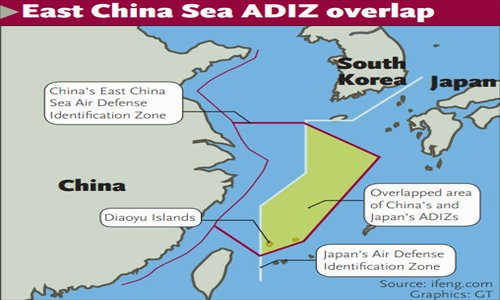Offshore security beefed up

East China Sea ADIZ overlap
China has established and immediately patrolled its first East China Sea Air Defense Identification Zone (ADIZ) over the weekend in a bid to guard its territory against potential air threats, a move Japan sees as "unacceptable" and targeting the disputed Diaoyu Islands.
The zone is not targeting any specific countries but aimed at protecting State sovereignty and both territorial and airspace security, as well as maintaining flying orders, Yang Yujun, the defense ministry spokesman, said on Saturday.
The defense ministry on Saturday announced the establishment of the zone by issuing the aircraft identification rules and a map of the zone, which covers a wide area of the East China Sea including the Diaoyu Islands.
The announcement noted that any aircraft flying in the zone should report to the Chinese authorities, identifying its flight plan, radio, transponder and logo. It also required aircraft to follow the instructions of the administrative organs.
China will take "emergency measures" to deal with air threats and unidentified flying objects, including monitoring, control and disposition. Yang stressed that will not affect the freedom of flight in relevant airspace.
Yin Zhuo, a military expert from the Chinese Navy Advisory Committee for Informatization, told the Global Times on Sunday that it was a necessary strategic demand for China as many countries nearby have strong air forces, including US troops.
"We need to protect some important defensive targets, such as the Yangtze River Delta region, a key economic center. This is the reason China set up its first air defense zone in the East China Sea," Yin said.
International law doesn't cover such zones so many countries have set them up. Since the 1950s, over 20 countries have established air defense identification zones.
The US began to set up the zones from the 1950s, stating that any unidentified aircraft may be regarded as a threat, potentially leading to interception by fighter aircraft.
Li Jie, a military expert, told the Global Times that many world powers have already set up such zones, which brought potential danger to China's aviation.
"The early warning time was set aside to identify potential air threats so China's forces can react quickly. It showed that the military has the confidence and determination to protect the country," Li said.
China's zone is located as close as 130 kilometers from some countries but an air defense zone of another country is also about 130 kilometers from the Chinese mainland at its closest, defense ministry spokesman Yang said, without revealing the country's name.
Li added the country might also consider tensions over disputed territories which were triggered by other countries, such as Japan.
Japan and the US reacted to the zone by saying that China has destabilized the region.
Japan foreign minister Fumio Kishida warned on Sunday that "unpredictable events" could follow China's unilateral declaration of an air defense zone over disputed islands. He added that Tokyo was considering making a high level protest to Beijing.
The Chinese Embassy in Tokyo on Saturday refuted a protest lodged by Japanese foreign ministry, stating that the Diaoyu Islands and its airspace are Chinese territory while Japan didn't have the right to make any protests.
The US Secretary of State John Kerry Saturday was "deeply concerned" at China's move and committed to defending Japan.
The US Secretary of Defense Chuck Hagel said the US, which stations more than 70,000 troops in Japan and South Korea, would not respect China's declaration of control over the zone.
"Japan and the US should stop such ridiculous overreaction. Those comments are aimed at stressing the so-called 'China threat' and regional tensions in a bid to damage China's reputation," Yin said.
The Diaoyu Islands dispute has caused continued tensions between China and Japan since Tokyo attempted to "nationalize" the islands that belong to China in 2012.
Hu Lingyuan, a professor with the Center for Japanese Studies at Fudan University, said that China's setup of the zone is a follow-up measure after announcing base points and baselines of the territorial waters of the Diaoyu Islands.
"Setup of the air zone would actually reduce the risk of conflict between China and Japan around the Diaoyu Islands area," said Hu, noting that Japan would have to restrain its aircraft from flying around the Diaoyu Islands for it must consider the consequences.
Liu Yunlong and agencies contributed to the story